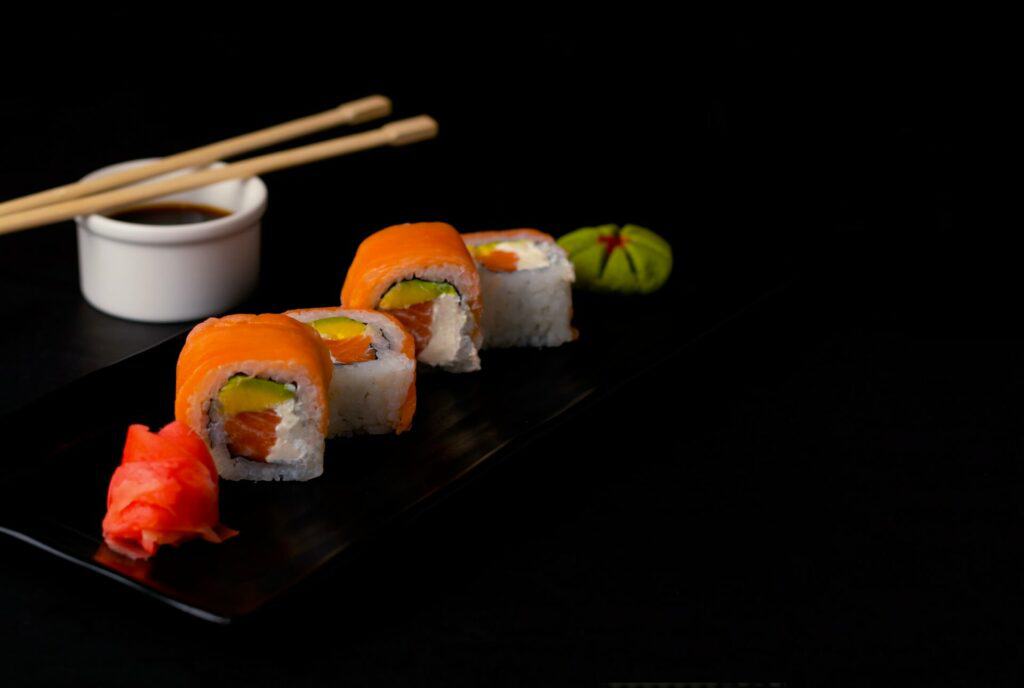If you’re a real sushi lover, you must be wondering how much of this delicious food you can eat without going overboard with nutrients and calories. This is a complex topic that depends on the type of sushi and its size. So, how many sushi pieces can you eat as a healthy adult? Let’s talk about the recommended sushi intake.
According to dieticians, healthy adults should consume no more than 10-15 pieces of sushi per week. This translates to 2-3 maki rolls since one roll makes for 6 or 8 pieces. The number should be less if you also eat nigiri, sashimi, or other types of sushi for the same meal. Raw fish should be limited to up to 7 ounces per meal.


If you like eating sushi, the chances are that you have trouble limiting yourself when these delicious Japanese specialties are served. No one can blame you for that, but the fact is that sushi shouldn’t be consumed in limitless amounts.
Although healthy, this food does have a few ingredients that force us to scale back and set the boundaries. I’ve explained all about this in the following text, so be sure to keep reading if you want to learn more about sushi.
How Many Sushi Pieces Can You Eat Per Week – What Is Considered a Healthy Amount?
Sushi is definitely one of the healthiest foods out there – but when consumed in moderation. It contains raw fish and seafood that are an excellent source of protein and omega acids, but it also can be made with plenty of other ingredients that have a lot of sodium, fat, and, subsequently, calories.
Let us not forget the beloved soy sauce – it’s so delicious that I could literally drink it just for fun, but this beauty also contains a lot of sodium, so it has to be used in smaller doses.
It’s clear that no one can stop you from stuffing yourself with dozens of sushi pieces if you don’t care much about the nutritional value of its ingredients. Still, I must also mention the raw fish – some species used for preparing sushi contain higher levels of mercury (which is poisonous in higher doses).
This means that the type of fish or seafood you choose also affects the amount of sushi you should consume.
How Much of Sushi Is Good for You?
Most resources out there claim that adults shouldn’t eat more than 15 pieces of sushi per week. The recommended number is somewhere between 10 and 15 pieces – that will allow you to ingest enough omega-3 and other healthy nutrition found in fish.
Depending on how many pieces you can eat for a single meal, this translates to 2 or 3 sushi meals – no matter how much we would like to eat it more often.
I know I would, at least.
How Big Are Sushi Rolls, Sashimi, and Nigiri?
Since it’s not wise to eat more than those 15 pieces per week, the question we can ask ourselves is this – can you even be full from eating sushi? Some probably won’t be so happy after, let’s say 5 pieces for dinner, but others will find it just enough for a satisfying meal.
I must mention that not all sushi is the same size, obviously – so whether it will be enough for you or not can significantly depend on the weight of your pieces.
Do you know how big sushi pieces are? If not, look at the table below, where I’ve gathered information on the weight of the most common types of sushi.
| Sushi | Weigh in grams |
| Piece from a maki roll | 30-50 |
| Maki roll | 250-300 |
| Nigiri | 30 |
| Sashimi | 20-60 |
Raw Fish Is One of the Main Reasons You Shouldn’t Eat Way Too Much Sushi
Raw fish is undoubtedly one of the tastiest foods out there. If you disagree with me on this, you’re probably wasting your time reading about sushi since most of these Japanese delicacies contain raw fish.
However, one of the essential things to keep in mind when enjoying this food is that it contains mercury.
Some species have lower levels, and some have higher ones. Now, depending on the type of fish you ingest, you should increase or decrease the weight of sushi you consume.
If you eat fish that’s low in mercury, the recommended amount is 12 ounces of fish per week (about 350 g) – for those high in mercury, it should be a little less than that.
Here are the types of fish that have higher amounts of mercury:
- Hamachi,
- Yellowfin tuna,
- King mackerel,
- Horse mackerel,
- Buri,
- Swordfish.
Sushi Can Have a Lot More Calories Than You Might Think – It’s Not Always a Good Choice for Weight Loss Food
I have heard many times that people think sushi is excellent diet food – simply because pieces are small and sushi generally contains healthy ingredients. This technically is true, but it all depends on what types of sushi you order.
If you commonly eat things like shrimp tempura rolls, you can’t expect anything but countless calories and a delicious taste. Luckily, there are many – also extra tasty – sushi options out there. The most obvious choices would be sashimi and nigiri – it’s basically just fish, with the addition of rice in the case of nigiri.
However, I never liked the idea of limiting myself when it comes to my sushi choices, so I usually just try to eat fewer pieces but make them more diverse.
Another very helpful tip I’ve been using for years is scaling down on the soy sauce. You wouldn’t believe how much sodium it has!
Besides, soy sauce is supposed to be used in moderation, so it doesn’t overpower the taste of your sushi, so it’s a win-win.

You Might Be Able to Eat Piles of Sushi – But That Isn’t Such a Good (Healthy) Idea
I don’t know many people who don’t like sushi – it’s just one of those universally loved foods, and plenty of us have trouble controlling ourselves when we see a full plate of this heavenly food.
I’ve explained health reasons that stand behind limiting sushi intake but let me say one more thing – these restrictions are important, but you won’t be hurt if you eat 16 pieces in one week instead of 15.
Just try to stay reasonable and enjoy your meals!